#pre-Incan
Explore tagged Tumblr posts
Text
Language of Flowers: Lupine
In the language of flowers, every day has its designated flower. That flower for today, November 8, is Lupine, which signifies voraciousness and imagination. Image above from Wikipedia. Lupine is said to bring inner strength to overcome trauma, and that new opportunities can be discovered when one finds the way to have a positive outlook. The word Lupine comes from the Latin word ‘lupus’,…

View On WordPress
#Andes#birthday#Egyptian#herbalism#Language of flowers#Lupine#Lupinus#lupus#Mediterranean#november#pre-Incan#Roman#Texas bluebonnet#wolf
0 notes
Text
500-year-old Snake Figure from Peru (Incan Empire), c. 1450-1532 CE: this fiber craft snake was made from cotton and camelid hair, and it has a total length of 86.4cm (about 34in)

This piece was crafted by shaping a cotton core into the basic form of a snake and then wrapping it in structural cords. Colorful threads were then used to create the surface pattern, producing a zig-zag design that covers most of the snake's body. Some of its facial features were also decorated with embroidery.
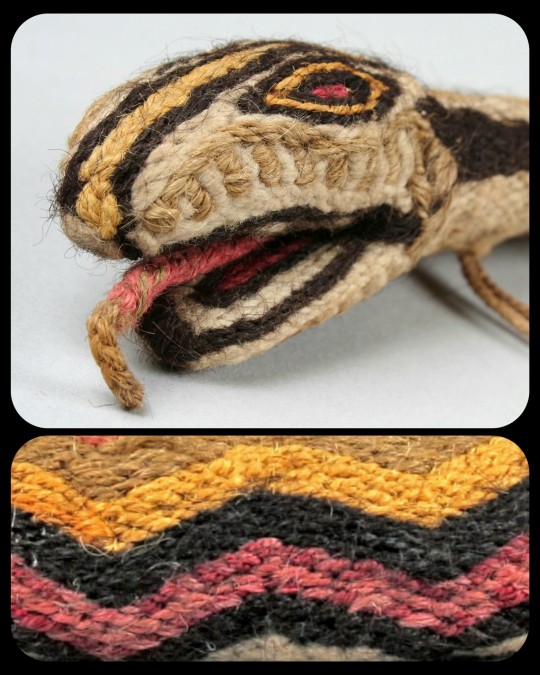
A double-braided rope is attached to the distal end of the snake's body, near the tip of its tail, and another rope is attached along the ventral side, where it forms a small loop just behind the snake's lower jaw. Similar features have been found in other serpentine figures from the same region/time period, suggesting that these objects may have been designed for a common purpose.
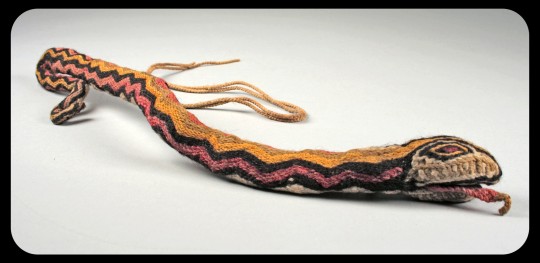
Very little is known about the original function and significance of these artifacts; they may have been created as decorative elements, costume elements, ceremonial props, toys, gifts, grave goods, or simply as pieces of artwork.
The Metropolitan Museum of Art argues that this figure might have been used as a prop during a particular Andean tradition:
In a ritual combat known as ayllar, snakes made of wool were used as projectiles. This effigy snake may have been worn around the neck—a powerful personal adornment of the paramount Inca and his allies—until it was needed as a weapon. The wearer would then grab the cord, swing the snake, and hurl it in the direction of the opponent. The heavy head would propel the figure forward. The simultaneous release of many would produce a scenario of “flying snakes” thrown at enemies.
The same custom is described in an account from a Spanish chronicler named Cristóbal de Albornoz, who referred to the tradition as "the game of the ayllus and the Amaru" ("El juego de los ayllus y el Amaru").
The image below depicts a very similar artifact from the same region/time period.
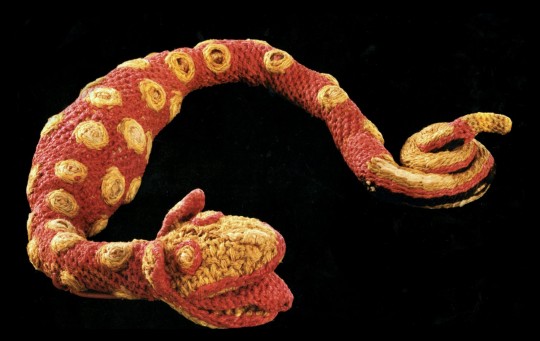
Why Indigenous Artifacts Should be Returned to Indigenous Communities.
Sources & More Info:
Metropolitan Museum of Art: Snake Ornament
Serpent Symbology: Representations of Snakes in Art
Journal de la Société des Américanistes: El Juego de los ayllus y el Amaru
Yale University Art Gallery: Votive Fiber Sculpture of an Anaconda
#artifacts#archaeology#inca#peru#anthropology#fiber crafts#americas#pre-columbian#andes#south america#art#snake#effigy#textiles#textile art#embroidery#history#stem stitch#serpent#amaru#mythology#andean lore#fiber art#incan empire#indigenous art#repatriation#middle ages#flying snakes tho
982 notes
·
View notes
Text
Inca Maiden
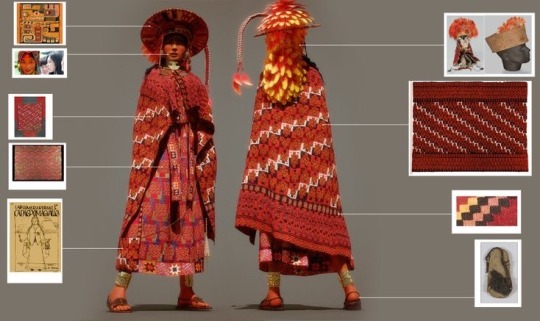
The clothes shown here correspond to the Chuquibamba style, an allied kingdom of the Inca empire
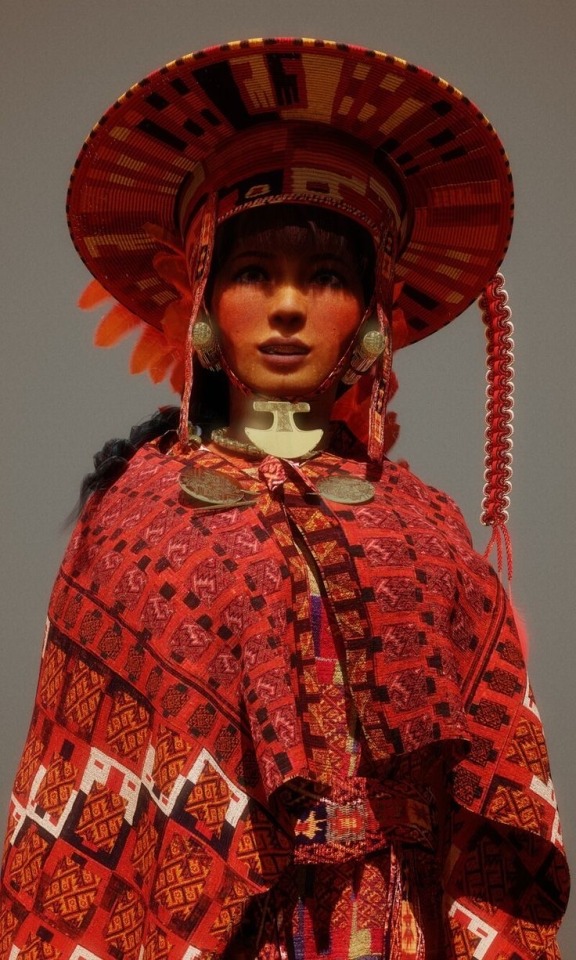
The acllas in the Tahuantinsuyu*, were the women of greater cultural preparation. These women were recruited and then chosen to be prepared in the so-called Acllahuasis, which were in charge of the Mamaconas, as stated by the chronicler Bernabé Cobo:
"... the acllahuasi or house of chosen women was an institution that brought together the Mamaconas or Ladies Mothers who acted as teachers and a credible number of girls entering a closing regime between the ages of ten and twelve. They were collected as a tribute among the most noble and beautiful ... "
Source
*Empire of four (the Inca empire)
#incan#inca#inca culture#incas#Inca Maiden#Maiden#Acclahuasi#Mamacona#tahuantinsuyu#Chuquibamba#incan art#pre columbian#peru#inca empire#ladie mothers#ancient history#ancient america#priestess#royality#noble woman#aclla#acllas
30 notes
·
View notes
Text
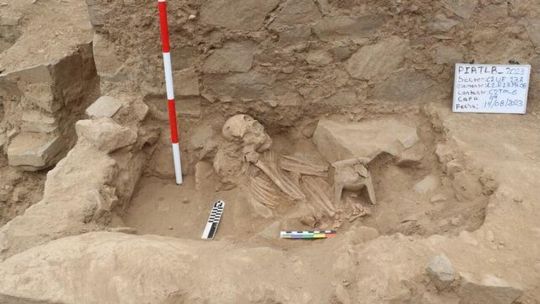
Pre-Incan Site for Ancestor Worship Found in Peru
A team of Peruvian and Japanese archaeologists has unearthed a pre-Hispanic archaeological site in northern Peru dedicated to ancestor worship, with burial chambers, human remains and ceramic offerings.
"We have discovered an archaeological site of the Wari period with an antiquity of between 800 to 1000 years AD" in the Cajamarca region 900 kilometers (560 miles) north of Lima, Japanese archaeologist Shinya Watanabe told AFP on Saturday.
"Two burial chambers with pits for placing mummies and offerings to the ancestors were found at the site," the expert said.
Each of the burial chambers contains two levels, and both have five niches in the walls that contain offerings such as mollusk shells, ceramic fragments and a tripod dish with three conical supports.
"It is a great find because the archaeologists were looking for evidence of the Wari culture," said Watanabe, who is a professor at Nanzan University in Japan.
A bundle containing a female character, a black Wari ceremonial vessel, two musical ceramic wind instruments, and two copper fasteners were also found.
The discovery occurred in the Jequetepeque valley in the province of San Miguel in Cajamarca, a region that abuts Ecuador.
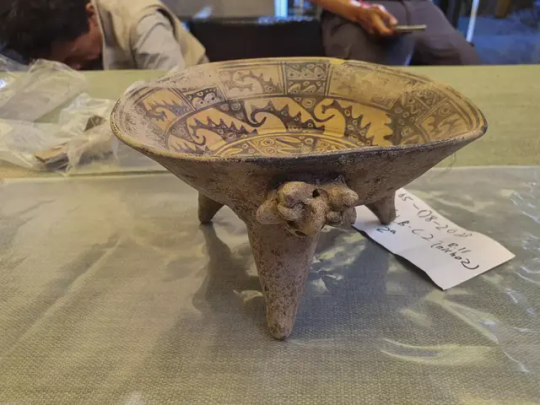
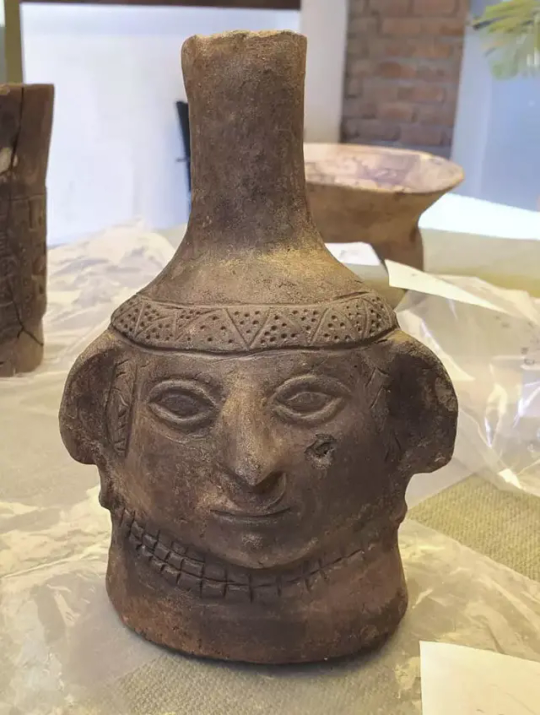
"Many people of multiple origins lived here. It was a ceremonial center dedicated to the cult of the ancestors," Watanabe said.
Judith Padilla, head of Cajamarca's culture office, said the findings allow for an understanding of "the lifestyle and ritual practices" of the ancient societies that inhabited the region.
The Wari culture survived between the 7th and 13th centuries over territory that is present-day Peru, but by 1100 AD the Wari were conquered by the rising Inca empire.
The discovery was made by the Project of Archaeological Investigation (PIA) Terlen-La Bomba and it occupies about 24 hectares (60 acres).
The Ministry of Culture indicated that the main objective of the research is to understand the socio-political system of the Cajamarca culture during the Middle Horizon (900 to 1000 years AD) and its relationship with the Wari culture.
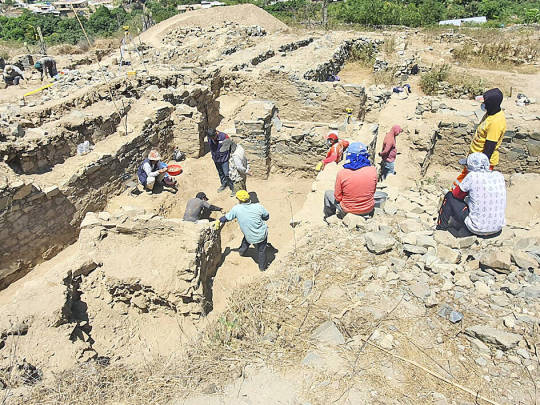
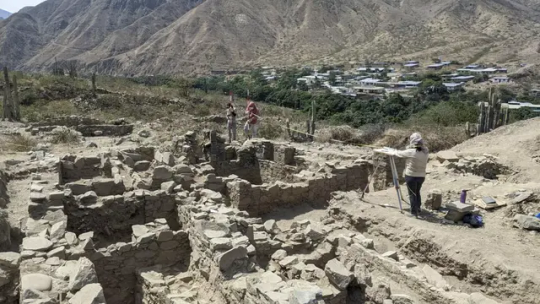
#Pre-Incan Site for Ancestor Worship Found in Peru#Cajamarca region#ancient grave#ancient tomb#ancient artifacts#archeology#archeolgst#history#history news#ancient history#ancient culture#ancient civilizations#wari culture
128 notes
·
View notes
Text
Some of the best 'Inca inspired' masks that my 3rd graders made for multicultural day.
(medium- pasta, beans, spray paint, on poster board)










1 note
·
View note
Text
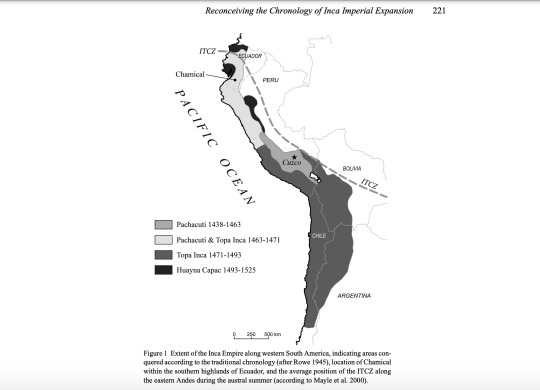
We start our expansion with the leaders that aided in the capturing of new territory; from Pachacuti (in Cuzco, Peru), Tupac Inca (expanding towards Quito, Ecuador), then with Huayna Capac proceeding south (into Bolivia, Argentina & Chile), finally with Huascar and Atahualpa expanding north into Colombia.
We're primarily looking at Pachacuti, Tupac Inca, and Huayna Capac's expansion; Which has brought the greatest expansion into Tawantinsuyu (more than 770,000 square miles of land) and later broken down into four suyus; Chinchaysuyu, Antisuyu, Cuntisuyu and Collasuyu.
Ogburn, Dennis E. “Reconceiving the Chronology of Inca Imperial Expansion.” Radiocarbon 54.2 (2012): 219–237. Web. Accessed 02 Feb. 2024.
Ochoa, Danny. “The Tawantinsuyu and the Frontiers of the Inca Empire.” How to Peru, 21 Feb. 2020, howtoperu.com/tawantinsuyu-and-the-frontiers-of-the-inca-empire/. Accessed 02 Feb. 2024.
0 notes
Note
trick or treat!
This is a Kendra headcanon that I like a lot but that I'm not sure will ever make it into anything I'm writing.
So: Kendra occupies a pretty strange place in the wider setting of Buffy. She's the first Slayer other than Buffy we meet, but the show itself is pretty aggressively uninterested in her. After the two parter she's introduced in, she's not mentioned again until Becoming, when she comes back to be killed off. She'll only be mentioned a couple of times after her death. Years and years after the show ended, Joss Whedon retroactively gave her full name as "Kendra Young", even though Kendra herself tells Giles that "[she] has no last name".
And the little scraps of backstory we do get about Kendra don't really feel consistent with anything we learn about how Slayers and Potentials operate, either. Kendra was identified as a potential Slayer when she was very small, and her parents (apparently willingly) gave her up to be raised by her Watcher, a Mr Sam Zabuto. She's very, very rules-focused, and familiar not just with the Slayer handbook but with more general details of the supernatural (for example: she's read about Angel before, which Giles himself hadn't, and she can cite sources about the Order of Taraka that Giles seems not to have read).
Meanwhile, the Council didn't know anything about Buffy or Faith until they were both Called, as far as we can tell, and even Potentials like Season 7's Kennedy who were identified at a young age don't seem to have been treated much like Kendra. Kennedy was trained to use weapons, but she doesn't seem to have separated from her parents (at least not based on how she talks about her childhood to Willow) or expected to memorize the contents of multi-volume arcane texts that even a Watcher like Giles describes as being "a bit stodgy" (in fact she tells Willow that magic "seems like fairy tale crap", so her theoretical knowledge must be pretty limited). Something is strange about Kendra. She's not like the other Slayers.
Kendra herself tells Buffy that "[her] people" take Slaying very seriously and that she sent to live with her Watcher at such a young age that she "doesn't really remember" her parents. And ... okay, well, let's be honest: this is mostly just bad writing. It can be explained by a combination of the show trying to position Kendra as, at all levels, an opposite to Buffy [Buffy lives with her mom so Kendra doesn't; Buffy's parents don't know she's a Slayer so Kendra's do; Buffy dislikes studying so Kendra must excel at it; Buffy has friends and dates so Kendra can't, etc.] and not caring particularly if the results add up to anything consistent. And it can, more damningly, be explained by the Buffy writers' regular automatic assumption that non-white people living outside the USA are necessarily more "primitive" and more in touch with old, pre-modern traditions, that they are less interested in the happiness of the individual and more respectful of authority and in doing what is best for the collective. That Kendra's people are like the Incans who sacrified the girl who we only know as "Ampata" (not her real name, of course), or the Shadow Men who activated the First Slayer, or Jenny Calendar's Uncle Enyos (who explicitly contrasts the beliefs of his "tribe" to those of "the modern man").
But what if things were different? What if this wasn't just another example of the show's constant background racism?
As it happens, as early as Season 1 we were already introduced to a group of people who take Slaying very seriously and who pass knowledge of the supernatural and the occult down to their children. People who think of themselves as having "destinies" and who make "tiresome speeches about responsibility and sacrifice". What if this group is, unbeknowst to her, the people Kendra is refering to when she tells Buffy about "[her] people"? What if Kendra's parents were Watchers?
We know that the Council don't always identify Potential Slayers at a young age, but they did manage to identify Kendra, at a young enough age that being a Potential is practically all the life she knows. What could explain that better than if Kendra herself grew up surrounded by Watchers? As soon as they decided to start looking for nearby Potentials, they'd have found one practically under their feet.
What if Kendra's parents had been expecting to train her as a Watcher, but now found themselves having to face the fact she might be Called as a Slayer? What if that's why her training focused so much on reading books and studying theory; why it made her into somebody Buffy describes as a "she-Giles"? What if her parents were hoping that she would grow up never being Called, until she was old enough that she never would, and she could become the Watcher they were always hoping she would be?
Well, we might ask: why then does Kendra claim not to remember her parents? And why does she tell Giles she doesn't have a last name?
This is, in fact, something of a mystery in any case: if Kendra's parents knew she was a Potential and were happy for her to be raised by Watchers -- even if they weren't Watchers themselves -- why was it necessary for them to cut off all ties with her? Why did she have to be raised in isolation? It can't have been for secrecy, because these people would have known that Kendra was a Potential Slayer. Again, this isn't something we see the Council insist on for any other Potential Slayer. Was there some ulterior reason that Kendra couldn't be allowed to know who her parents were, or to talk to people who might have known them?
Well, remember what Quentin Travers accuses Giles of having in Helpless: "a father's love for the child ... and that is useless to the cause". How might somebody like Travers reacted to finding out that a Watcher had potentially given birth to a Slayer? Would he trust them to raise her? Would he allow it?
What if, instead of cheerfully giving her up, Kendra's Watcher parents -- or perhaps parent, singular -- had to agree to raise her as if she wasn't theirs, just to prevent the Council from swooping in and taking her away? What if the reason Kendra thinks she hasn't got a last name is that, if she'd remembered what it was, she'd have noticed it was the same as somebody else she knew? What if, while Buffy had a Watcher she often thought of as a father even though they weren't biologically related, and who was punished for being too much of a father figure, Kendra had a Watcher who was related to her, but who was under Council orders not to tell her that he was?
What if "Kendra Young" was born "Kendra Zabuto"?
164 notes
·
View notes
Text

Pre-Incan salt pools in Maras, Peru by Joe Curtin
129 notes
·
View notes
Text
Crows Name Meanings because why not?
🐦⬛ Kaz:
Meaning: Destroyer of peace; One who declares peace; Child of peace or harmony
Kaz is an incredibly dynamic name popular for boys and has Slavic origins.
Kaz comes from the name Cassius, which means “hollow”, and was famously worn by one of the conspirators against Julius Caesar. This may be why it has gained the meaning “destroyer of peace.”
However, Kaz has an endearing connotation, too! In Japanese, Kaz comes from Kazuko, which means “harmony” and “child of peace.” This powerful title will find a home in a soul who is unafraid of forging their own, unique path.
Baby Kaz will undoubtedly stay true to themselves as they journey through life, carrying a remarkable presence everywhere they go.
🌺 Inej:
Meaning: Faithful, The faithful one
Inej is a girl's name of Spanish origin.
Meaning "faithful" or "the faithful one", this name is for the parent intending to raise baby in a life of faith.
🎲 Jesper:
Meaning: King of the treasure; Treasurer
Jesper is a masculine name of Danish, Dutch, and Persian origin.
A variant of the Persian name Jasper, this name translates to “King of the treasure” or “treasurer.” Wealth comes in many forms, whether it’s gold, knowledge, or moments with your loved ones.
Of course, baby is going to be a priceless new addition to your family. If you want to always remind baby how invaluable they are, the name Jesper makes for a bountiful choice.
🎼 Wylan:
Meaning: Wayside land; Crafting one; Brave in battle
Wylan offers a dapper appellation steeped in cool kid vibes. A form of Waylan and Waylon, masculine Wylan is a topographical name meaning “wayside land.” Wylan’s origins don’t stop there, as the name also has Germanic and Old Norse roots, where it derives from Wayland.
Wylan adopts the meaning “crafting one” from Wayland the Smith, a mythological master blacksmith who escaped the king’s custody by flying away with a winged cloak he crafted. He is mentioned in several Germanic and Old Norse poems, including the Old English classics, Waldere and Beowulf.
Wayland may also mean “brave in battle,” equipping baby with a warrior-worthy title. Not only is Wylan effortlessly chill for the cool-as-a-cucumbers, this handsome title comes steeped in ancient lore and ingenuity.
🫀Nina:
Meaning: Little girl
Nina is a girl’s name with various possible origins, arguably the most well-known being Spanish.
Aptly meaning “little girl,” this simple title never seems to go out of style.
Sharing her name with the Incan goddess of fire, Nina can be inspired to let her flame burn bright. Also connected to a Babylonian goddess, there is no shortage of heavenly influences for this little girl.
🐺 Matthias:
Meaning: Gift of God; Bear
Matthias is a refreshing twist to the ancient masculine name Mathew sure to give baby a distinctive edge.
Emerging from the Hebrew Matityahu, meaning "gift of God," Matthias bears this definition with all the swagger of a rock star.
As much as Matthias seems to push against tradition, its very sound directly links it with the Ancient Greek translation of Matityahu, Mattathias, which pre-dates even Mathew.
Touring overseas to Celtic shores, Matthias finds an intriguing kinship with the Irish mathúin, which means "bear." A relic with a rugged appeal, as names go.
Matthias serves up stage presence before baby has even taken their first steps.
Do with this what you will
#sad inejs was so short#tried to make their emoji something they like rather than what they are that flower looked the closest to geraniums#kept nina as a heart as her identity as ghrisa means more to her than waffles#considered giving matthias a tree 🤔#maybe i will but i think trassle meant more to him in the end#also considered a wad of cash for kaz but lets be real he values his crows more#kaz brekker#jesper fahey#inej ghafa#wylan van eck#you type ‘wylan can eck’ once and tumblr wont let you forget it#🙄#nina zenik#matthias helvar#soc#six of crows
87 notes
·
View notes
Note
Are the Urswali-Dain people/the dainlands apart of Imperial Wardin?
No, Imperial Wardin is relatively small (though in-universe is pretty damn big. Most societies are small scale, singular state-entities that control this much territory are an outlier.). It is Interactive with some of the Dain-speaking populations on the other side of the Viper (and has some wholly unrealized expansionist designs against them), but no territorial control whatsoever. (Also there's been a lot of revision since they were last brought up, Urswali do not speak a Dain language family tongue).

A lot of fictional pre-modern empires are modeled after The Big Ones with massive territorial claims (or to be real, Rome specifically rather than other Big Ones like the Mongol or Incan empires) so I think that a lot of people have that in the back of their minds but like. Nah it's a relatively small space of land (my current estimate is like..... about the size of contemporary Spain?? give or take?????). The models I've referenced for designing its structure and logistics are geographically smaller states (I would consider the Aztec, Mali, and Maybe the Athenian (via Delian League) states to be decent analogues in very different ways, though none are actually like. Close analogues.).
It's composed of eight provinces all deferential to the Usoma ruling out of the Wardin province- a core alliance between two former kingdoms and a city-state (Wardin, Ephennos, Godsmouth/Odkottonos respectively) two that were fully conquered and made into provinces in state-formation (Erub and Erubinnos), and two former 'tributary' states that have fully lost their self-governance and are now provinces (Jatsait and Lobera). Each province is comprised of a core territory (usually a former kingdom or city-state) and its own tributaries (conquered/controlled non-citizen regions that retain a degree of self governance in return for economic tribute), with Lobera effectively being the biggest province via having most of the northern half of the region as a tributary. Finnerich was conquered as a tributary in a particularly aggressive manner (its self-governance was Extremely nominal and it probably would have been fully absorbed as a province if everything went nice and smooth for the Imperial Wardi side) but is completely independent at this time.
Non-Wardi ethnic groups native to the region and existing wholly within its claimed territory are the Hill Tribes, Cholemdinae, North Wardi, and Jazait. Some Wogan groups exist within its claimed territory, but most of the population is further east. 'Wardi' as a quasi-ethnic descriptor is very, very complicated, and what distinguishes someone being of Core Wardi identity and not is entirely due to the historical trajectory of assimilation, rather than actual close shared ancestry. The core 'Wardi' group is composed of 10 major tribes that self-assimilated or were assimilated into this shared identity, while the Cholemdinae, North Wardi, and Wogan groups represent descendants of other related tribes that did not assimilate (on population rather than individual levels). So like as an example- the South Wardi (mostly the former Wardinae tribe) share the Most recent common ancestry with the Cholemdinae, and less recent common ancestry with the Ephenni. On POPULATION levels, the South Wardi and Ephenni both culturally/religiously assimilated while the Cholemdinae did not, and therefore are both 'Wardi' (with some sense of subcultural identity) while the Cholemdinae are still Cholemdinae.
'Imperial Wardi' identity complicates this further, in that it is based on religious affiliation, Core cultural practices, and legal citizenship rather than ethnicity (and includes several major foreign migrant/diaspora groups). For example, the Yuroma-Wardi population is mostly a diaspora group from outside the region, but are part of the Imperial Wardi cultural sphere due to shared religious practices, cultural integration (with retained subcultural identity and practices), and citizenship, as well as a fairly long history in the region. Or alternatively, some individual people/groups of Cholemdinae, North Wardi, Wogan and/or Hill Tribes descent are Imperial Wardi as citizens and cultural-religious adherents, while not being 'Wardi'. Contemporary Wardi identity is now treated as a specific ethnic identifier, but Imperial Wardi identity is (at least ostensibly) accessible regardless of ethnic origin.
So that might clear up the full extent of the state/it's cultural sphere lol.
36 notes
·
View notes
Text
On the topic of fantasy pet peeves, or rather fantasy criticism pet peeves, I see a lot of people make a big deal about "lazy worldbuilding" when a kingdom shares the name of either its ruling dynasty. This isn't exclusively a charge levied against media of East Asian origin, but it certainly shows up there a lot.
Now this was very unusual in medieval Europe. Most European countries are derived from tribal names: the Franks became France, the Danes became Denmark, the Angles became England, the Poles became Poland, et cetera. (Though often with a fair bit of migration.) Many others come from their provincial designations under the rule of larger states: Roman Hispania became España; Habsburg-era "pays d'embas", "lands down there", was translated literally into Dutch as Nederlanden.
Pre-medieval kingdoms - most notably the Merovingian and Carolingian Empires - were referred to by their ruling dynasties, but this came to a pretty significant end because of the Germanic tradition of partitive succession. Lands were divided between the heirs instead of passed to a singular successor, leading to a single dynasty ruling multiple different realms - most notably for Carolingians, who in two generations went from controlling most of Western Europe as a unified Frankish Empire to five kingdoms who were often at war with each other.
Needless to say, the rule of several hostile kingdoms by the same nominal dynasty quickly put the kibosh on any sense of dynastic naming in Europe, and tribal names came to dominate as things were formalised in the medieval period. Not so for much of the rest of the world. (Or Liechtenstein.)
Almost every major Arab state took its name from the ruling dynasty, which spread to many non-Arab Muslim realms such as the Ottoman Empire (named for the ruling House of Osman, also called the Ottomans), the Ghaznavid Empire (ruled by the Ghaznavid dynasty), the Timurid Empire (ruled by, surprising no one, the Timurid dynasty)...
Likewise, China is pretty much exclusively described historically in terms of its dynasties, who traditionally picked a new name for their state and government when they came to power. While there was a general idea of a territorial "China" (Chinese Zhongguo, often translated as "Middle Kingdom"), it was only rarely used compared to the dynastic titles. (As far as I'm aware, only the Qing ever really used it in an official context to refer to themselves, and even then the official name was still "(Great) Qing".)
Indian historiography is a bit split; the Maurya and Gupta Empires are referred to by their dynasty, but also as dynasties of a territorial/tribal Magadha Kingdom. The Pala Empire is solely named for its dynasty, but was the successor state of the Gauda Kingdom, named for its territory.
The Aztecs were primarily defined in terms of their city-states, but the Mayans were split between city names and dynastic ones at the time of the Spanish invasion. (Or at least they seem to be; it's hard to find good sources on the etymology of Mayan principalities in English.)
(I'd put in a note about the Incan Empire as well; "Inca" in Quechua essentially means "king" or "nobleman", so a literal English interpretation of "Incan Empire" would be "Emperor's Empire". The endonym for the Incan Empire translates to something like "union of four provinces", with two of the provinces being ethnonyms and two being directional. One of the directional ones might be both, and it's unclear which came first. Honestly, you could do another post about this just for directional names...)
So yes, "King X of the Kingdom of X" is a completely normal thing. Hell, we have two countries that do it today - Liechtenstein (ruled by the House of Liechtenstein) and Saudi Arabia (ruled by the House of Saud). (Both of them are absolute monarchies.)
33 notes
·
View notes
Text
𝐒𝐖𝐀𝐋𝐋𝐎𝐖𝐄𝐃 𝐈𝐍 𝐓𝐇𝐄 𝐒𝐄𝐀; preface
𝐏𝐑𝐄𝐅𝐀𝐂𝐄 ¡!
next: I. 𝐞𝐚𝐬𝐭 𝐛𝐥𝐮𝐞 | table of contents
𑁍
get lost and then get found, or
˗ˏˋ SWALLOWED IN THE SEA'ˎ˗
one piece

❝I DON'T THINK I'VE EVER HAD A DREAM OF MY OWN.❞
┊ ✧. being a marine was supposed to be your dream since you were a child. it was what you were born to be— until the straw hats pull the sheet back from over your eyes.

PLAYLIST .ೃ࿐
swallowed in the sea; coldplay
❝and i could write it down or spread it all around, get lost and then get found,
and you'll come back to me, not swallowed in the sea.❞
kiss from a rose; seal
❝there used to be a greying tower alone on the sea,
and you became the light on the dark side of me.❞
caribbean blue; enya
❝so the world goes round and round with all you ever knew,
they say the sky high above is caribbean blue?❞
make your own kind of music; cass elliot
❝nobody can tell you there's only one song worth singing,
they may try and sell you 'cause it hangs them up to see someone like you.❞
sinking boat; infinity song
❝no safety in the riches, the glory, or the castle guard,
the sunset cast a shadow over the boulevard...❞
the anchor song; bjork
❝underneath is all currents and drop my anchor,
and this is where i'm staying; this is my home.❞
sunny; boney m.
❝sunny, thank you for the smile upon your face—
sunny, thank you for the gleam that shows its grace.❞
corner of the earth; jamiroquai
❝so inspired of that, there's nothing left to do or say...
think i'll dream 'til the stars shine.❞
life & soul; the sundays
❝here on the shore, we're going to be,
here I go, it's all my sea, all my blue...❞

FOREWORD .ೃ࿐
˚ · . warnings¡!
HEAVY LANGUAGE USE
CAN WE GET MUCH HIGHER?
CANON-TYPICAL VIOLENCE & INJURIES
˚ · . notes¡!
SANJI X FEM!READER X ZORO FRANKY X ROBIN NAMI X VIVI
┊ ✧. mc is 19 pre-time-skip and 21 post-time-skip; all characters are their canon ages
✧. this fic will cover all of the one piece arcs! yes, all of them!!! however, it will be more of a collection of scenarios than a fic with a continuous plot line!!
✧. this is a sanji x reader x zoro fic but its VERY slow burning! its more of an extra element bc i am in love with both of them #throuple
✧. any other ships are the ones i ship so i don't give a fuck if you don't because at the end of the day, this fic is a HUGE passion piece that is very self-indulgent
✧. mc's fighting style and weapon choice are based off the peruvian/incan fighting style rumi maki and incan weapon boleadoras bc i am a proud peruvian :9
started: 10.06.2024
ended: n.a.

for an easy reading experience, follow # swallowedintheseaop
#swallowedintheseaop#one piece#op#one piece x reader#roronoa zoro x reader#vinsmoke sanji x reader#zoro x reader x sanji#zosan#frobin#namivivi
21 notes
·
View notes
Text
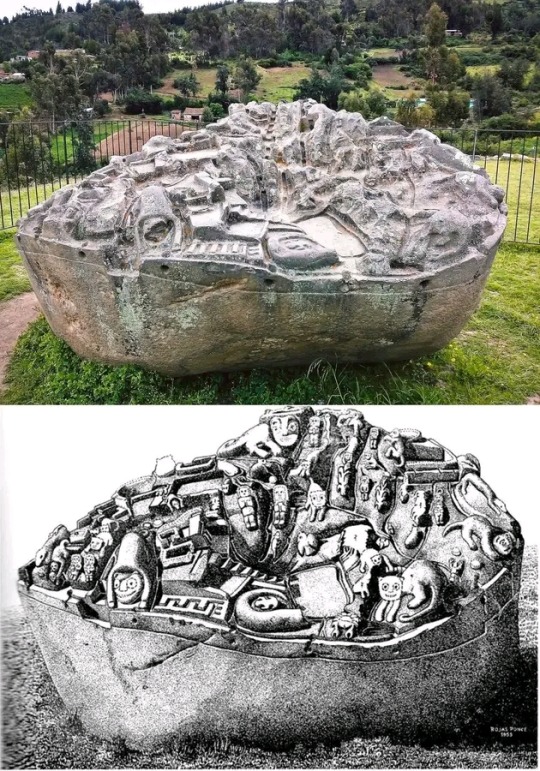
About two meters long, and four meters wide, the mysterious Sayhuite monolith is an enormous rock containing more than 200 geometric and zoomorphic figures, including reptiles, frogs, and felines. Found at the top of a hill named Concacha, the stone was sculpted as a topographical hydraulic model, complete with terraces, ponds, rivers, tunnels, and irrigation channels. The functions or purposes of the stone are not known, but researchers believe the monolith was used as a scale model to design, develop, test, and document the water flow for public water projects, and to teach ancient engineers and technicians the concepts and practices required. The rock was "edited" several times, with new material, either altering the paths of the water or adding routes altogether.
While the creators remain a mystery, the monolith provides archaeologists with insight into the culture of the pre-Columbian population. Archaeologists have determined that the site was an Incan religious center, where rituals and ceremonies for the worship of water was conducted. The monolith is an important clue to this, since it depicts a water-like flow between the carvings. Modern-day engineers also speculate that the monolith is a depiction of the irrigation systems present within the Incan culture.
-John Gotti's Era
22 notes
·
View notes
Photo
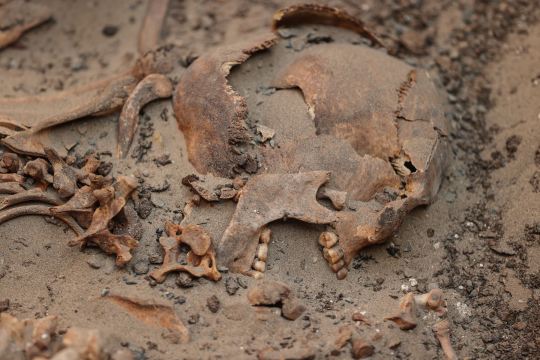
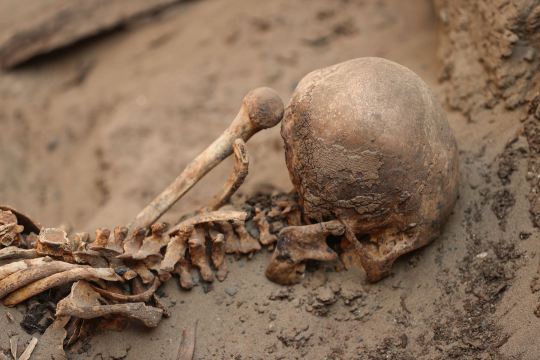
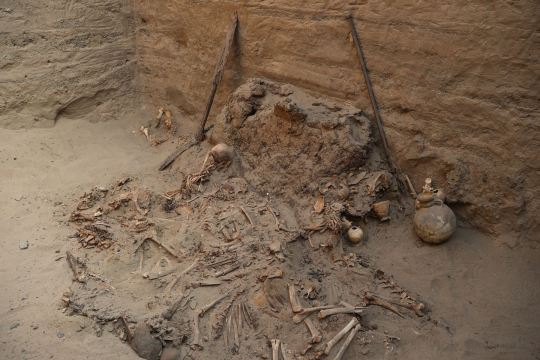
Sea Lord’s 1,000-Year-Old Tomb Uncovered in Peru
Hidden under the tan-brown dirt of Peru, a sea lord’s skeleton rested among the luxuries of the afterlife. Surrounded by sacrifices and offerings, the elite figure was forgotten — until now.
Archaeologists excavating the Macatón cemetery in Huaral uncovered the large tomb, the National Major University of San Marcos said in a May 15 news release.
The 1,000-year-old tomb was about 23 feet deep and about 23 feet wide, the release said. Inside, archaeologists found an elite figure, as well as five other people, four llamas and several pottery vessels.
The burial was left by the Chancay culture, a pre-Incan culture that developed between 1000 and 1500 A.D., the release said.
The tomb’s central elite figure was identified as a sea lord, the excavation’s lead archaeologist Pieter Van Dalen Luna told EFE. The presence of a wooden oar — the first artifact of its kind found at the Macatón cemetery — led to this identification, the outlet reported.
The sea lord was likely dedicated to fishing, shellfish hunting or another marine activity, Van Dalen said.
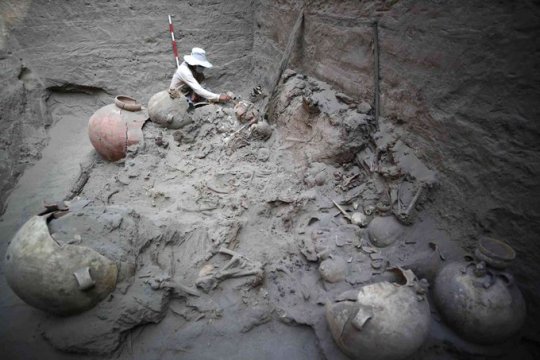
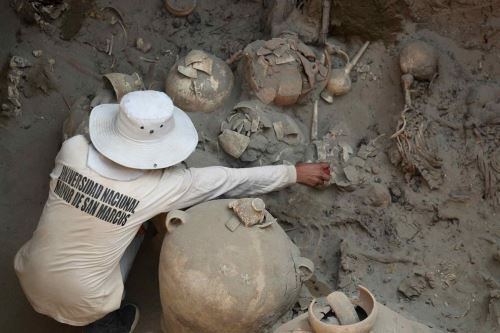
The burial also contained 25 pottery vessels with offerings of food for the deceased’s afterlife, EFE reported.
The Chancay culture believed deceased individuals did not cease to exist but became protective ancestors through a series of transformative stages on their path to the dead, experts said in the release.
The Chancay culture faded around 1500 A.D. at a time coinciding with the Incan empire’s territorial expansion, EFE reported.
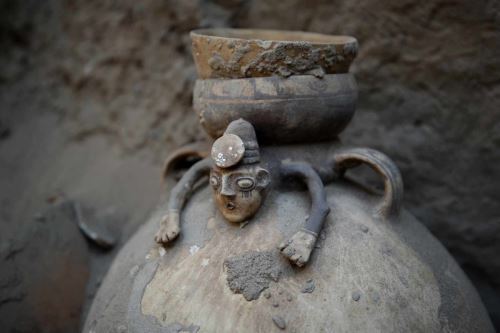
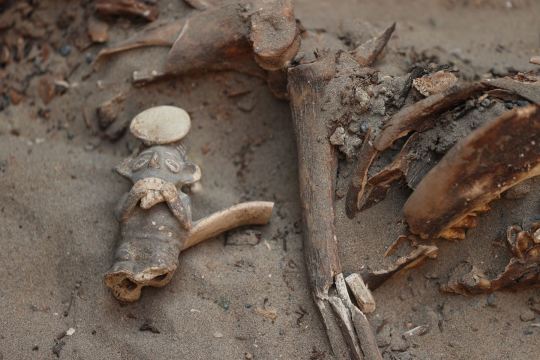
The excavation site is about 165 feet from a neighborhood of homes, BBC reported. These houses are likely preventing archaeologists from uncovering other tombs, but the houses also deterred looters from disturbing the area, archaeologists told the outlet.
The sea lord’s tomb is the oldest and largest tomb of about 80 burials found in the Macatón cemetery so far, BBC reported.
Archaeologists will continue analyzing the remains of the deceased to further understand the burial, the release said.
Haural is about 45 miles northwest of Lima.
By Aspen Pflughoeft.
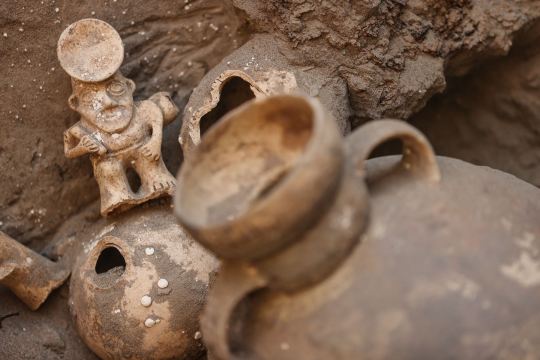
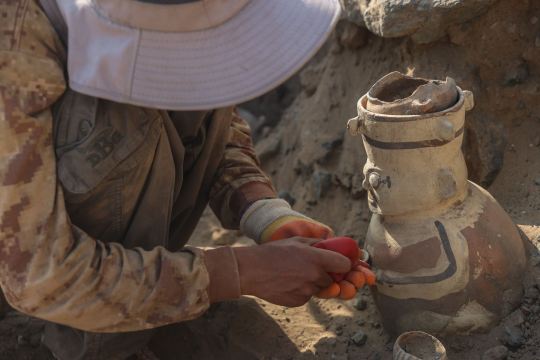
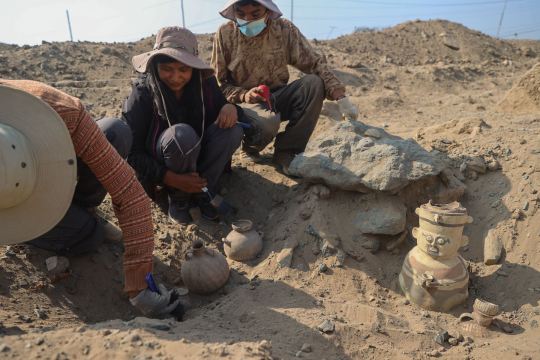

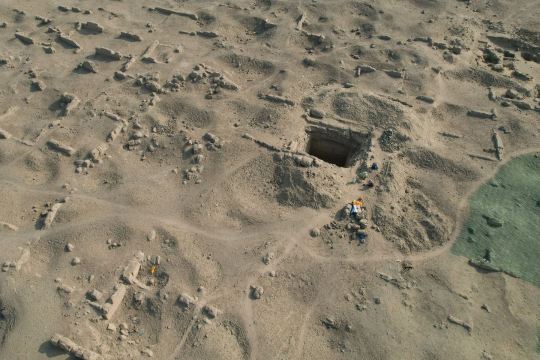
#Sea Lord’s 1000-Year-Old Tomb Uncovered in Peru#Macatón cemetery#chancay culture#pre-incan culture#ancient tomb#ancient grave#skeleton#pottery#ancient artifacts#archeology#archeolgst#history#history news#ancient history#ancient culture#ancient civilizations#long reads
64 notes
·
View notes
Text
November 27, 12:12 PM
I don’t know what came over me, but curiosity got the better of caution. I’ve crept closer to the city below—still keeping a safe distance—and found a spot behind a large boulder overlooking what looks like a bustling marketplace.
From here, I can see the people. They’re dressed in colorful woven fabrics, their patterns intricate and vibrant. Some carry baskets on their backs; others are arranging clay pots and what look like corn and potatoes on blankets. Children dart between the stalls, laughing, while older men and women speak in tones I can’t understand. There’s a rhythm to their movements, a harmony that feels ancient and unshakable.
I can also see a large stone structure dominating the plaza—maybe a temple? There’s smoke rising from its peak, and I think I heard a deep, resonating hum earlier, like chanting. I can’t shake the feeling that whatever they’re doing is sacred. I don’t belong here.
But I can’t leave yet. Not without learning more.
For now, I’ve sketched what I can see (messy, I know—I’m shaking). I’ll stay hidden and watch a little longer. I need to figure out if it’s safe to approach—or if they’ll see me as some kind of intruder. My biggest fear? They won’t understand my language… or worse, they will.
I’ll decide what to do next once I feel less like a deer caught in headlights.
[See attached sketch.]
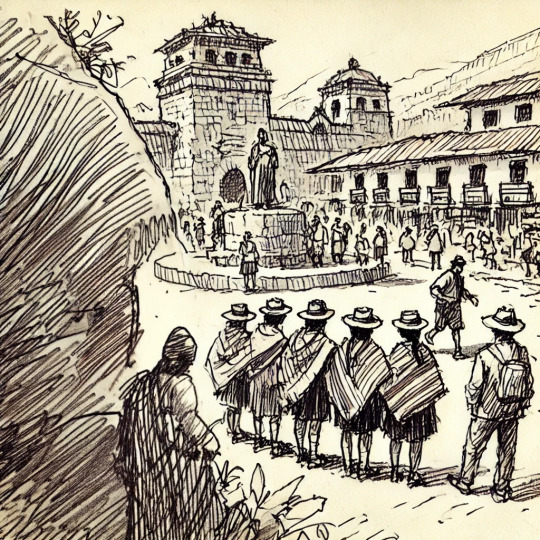
#time travel#travel diary#historical fiction#speculative history#Incan Empire#Tawantinsuyu#ancient civilizations#Andes Mountains#Pre-Columbian History#Lost in Time#diary of a time traveler#illustrated journal#breathtaking Andes#Mystery Sketchbook#AmWriting#Quick Sketch#Visual Storytelling#Historical Worldbuilding#Creative Writing Blog
0 notes
Text


I don’t think I’ll color these so I’ll post em now. Pre-sour Pester and Dastardos (based on art in the game and some personal headcanons, I’ll talk about them under the cut)
And my vp sona, this is their casual outfit, making another outfit for them when they work with storkos


Bonus doodles for shits and giggles

Might finish this another time, early concept art of Dastardos makes him look like a plushie so i wanted to draw him and his siblings like that
Anyways first pic explanation and ramble… Lester design was pretty straightforward, mostly just eyeballed that one portrait of him in the journal. I originally was gonna give him a beret (beatnik? Idk) but i went with those scottish caps instead, he seems like the type to wear those. Also gave him Arfur’s eyes
Stardos is more headcanon based. I imagine he would’ve wore Incan like clothing before he went sour. More acclimated to colder environments compared to Leafos and Seedos, probably would’ve worked with Storkos in some way. (Like up in the mountains.)
#viva pinata#dastardos#professor pester#seedos#leafos#random tooner event#I haven’t named my vp sona yet#might call em Featherstone
23 notes
·
View notes